
Review: The many roles of AVP1, a H+-PPase ($)
Plant Science Research Weekly, Research0 Comments
/
The AVP1 gene encodes a proton-pumping pyrophosphatase (H+-PPase) localized to the vacuolar membrane, which means that it pumps H+ into the vacuole using energy stored in pyrophosphatase (PPi). The direct consequences of its action are the acidification of the vacuole and the removal of PPi from the…
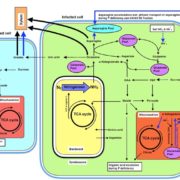
Review: Adaptive strategies for N metabolism in P deficient legume nodules ($)
Plant Science Research Weekly, ResearchLegume nodules fix N, but their function has a high requirement for P, making nitrogen-fixation highly sensitive to P deficiency. Valentine et al. review how P limitation affects nodule function and also how nodules respond and adapt to P deficiency, drawing largely on studies of Virgilia divaricata,…

Review: Transport and homeostasis of K & P ($)
Plant Science Research Weekly, ResearchNitrogen (N), phosphorus (P), and potassium (K) are the three macronutrients required in highest amounts for plant growth. N is abundant in the atmosphere, therefore plentiful if we overlook the energetic costs of converting N2 to usable form. By contrast, K and P are present in limited amounts in the…
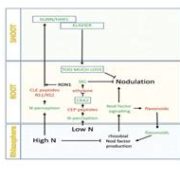
Review: Nitrogen sensing in legumes ($)
Plant Science Research Weekly, ResearchAs a consequence of their ability to fix nitrogen in symbiosis with bacteria, legumes make key contributions to ecosystems and provide protein-rich foods for humans and other animals. Recent years have uncovered the nature of the signals involved in the cross-kingdom dialogues that occur between plant…
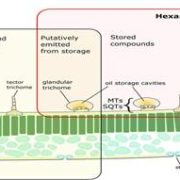
Aphid colonization on tansy influenced by emitted terpenes
Plant Science Research Weekly, ResearchTansy plants (Tanacetum vulgare L.) have diverse ethnobotanical uses including that of insect repellent, as a consequence of their production of volatile terpenes. Clancy et al. investigated the diversity of these emitted terpenes, and how they affect colonization by aphids and the ants that tend them…
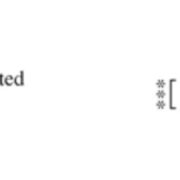
Domestication impacts on plant–herbivore interactions: a meta-analysis
Plant Science Research Weekly, ResearchIt is widely stated that domestication has contributed to a decrease in plant resistance to herbivory, but to what extent is this true? In a contribution to a special issue on “Human influences on evolution”, Whitehead et al. describe results of their meta-analysis. Although their data show a consistent…
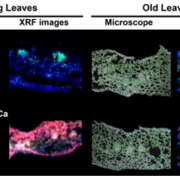
Calcium Deficiency Triggers Phloem Remobilization of Cadmium
Plant Science Research Weekly, ResearchCadmium (Cd) is among the most toxic heavy metal to humans. Contamination of Cd in soils poses a serious threat to both crop productivity and human health in many parts of the world. Understanding the molecular mechanisms of Cd transport process will help in developing plants for soil remediation and…
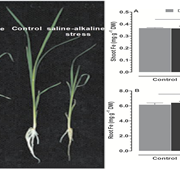
Iron acquisition and saline-alkaline tolerance in rice
Plant Science Research Weekly, ResearchSoil saline-alkalization is a major abiotic stress to agriculture worldwide, causing considerable damage to crop growth and loss of crop productivity. In alkaline soil, iron availability to plants also becomes very limiting. This paper explores the physiological and molecular mechanisms of rice plant’s…
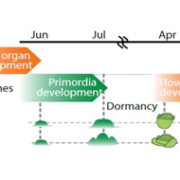
Epigenetic regulation of sex determination in polyploid persimmon
Plant Science Research Weekly, Research, The Plant CellAlthough most flowering plants produce flowers with male and female parts, there are exceptions which are broadly classified as dioecious (two houses; each individual is male or female, usually associated with the presence of a sex chromosome) and monoecious (one house, separate male and female flowers…

